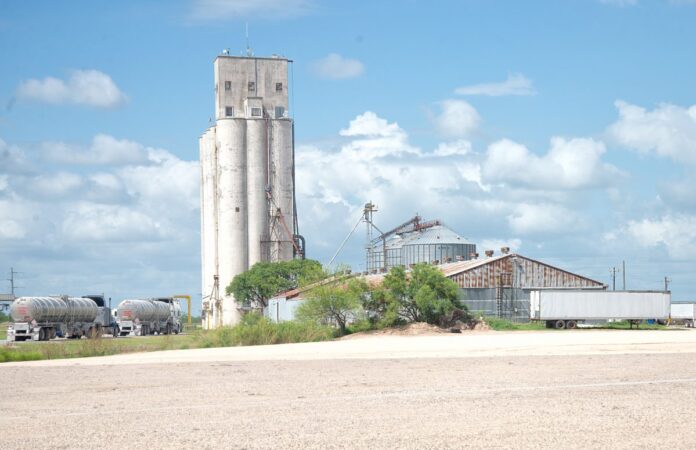HARLINGEN — The business downturn associated with coronavirus lockdowns and shelter-at-home mandates has spared the Port of Harlingen.
Port officials say the activity of personnel at the facility on the Arroyo Colorado has been altered somewhat, but the port’s core products of sand and cement, liquid fertilizer, sugar, gasoline, diesel, cotton and grain have been moving through the port as usual.
“When it first came out, when we kind of went into lockdowns and shutdowns, the port was considered an essential business and we all were considered essential workers,” Port Director Walker Smith said Wednesday. “But we operated as a skeleton crew for the most part, and for several weeks it was just myself and my operations guy in the office to make sure we were overseeing operations at the port.”
Business at the port has been booming, with total tonnage increasing from just under 1 million tons a year in 2014 to more than 2 million tons in 2019, Smith said.
“We didn’t see a slowdown in port traffic for any of our tenants at the port,” Smith said. “If anything, our fuel guys, because of the lack of driving around and the shutdowns, the refineries were backing up on fuel so there was fuel readily available for those that were able to still access it.
“Business was still normal or being operated as normal as far as exporting diesel for Mexico, and the agriculture guys were considered essential businesses as well,” he added. “Crops don’t stop growing just because of what’s going on in our daily lives.”
Part of the port’s success over the past few years has been its rise as a critical export terminal for diesel fuel bound for northern Mexico.
Nearly every day at the port, Mexican fuel transport trucks, sometimes numbering in the hundreds, are lined up awaiting loads of diesel.
In fact, the port just completed an $8.2 million upgrade for concrete staging pads for the idling Mexican transport trucks, paid for with a $7.8 million grant from TxDOT and the rest with port funds.
Smith is confident the export market for diesel will remain strong at the port for years.
“Mexico just doesn’t have the refining capabilities to meet their demands for fuel so they’ve got to get it from us,” he said. “For them to be able to get that kind of infrastructure needed to meet that demand, it’s going to take years and years if not decades to get in a place to meet that demand.”
Mexico has a lot of demand, being the world’s sixth-biggest market for motor fuels, which amounts to a daily demand for nearly 1.18 million barrels of gasoline and diesel.
But Pemex, the government-owned refining and distribution agency, can’t meet that demand since it’s six domestic refineries are now operating at about one-third capacity due to underinvestment and long-deferred maintenance.
In an attempt to deter fuel thieves — the government reported more than 12,500 illegal pipeline taps in 2018 — President Andres Manuel Lopez Obrador ordered many of the pipelines which move distillates such as gas and diesel through Mexico shut down
Hence the market for diesel from the Port of Harlingen, which arrives via barge from the gulf.
“Speaking with our tenants on a regular basis, and asking them, even with possible pipelines coming back online, there’s still going to be a huge demand and need for diesel going forward,” Smith said. “It’s great for us.”
Port of Harlingen facts
Commodities: Sand/cement, liquid fertilizer, sugar, liquid bulk products (gasoline and diesel), cotton and grain
Tonnage: About 2 million tons of cargo move through the port each year via barge, truck, rail and air
Economic impact: $1 billion annually
Jobs: Port activity sustains more than 4,600 jobs
Taxes: The port generates, through usage and cargo fees, more than $17 million a year in local and state tax revenue





